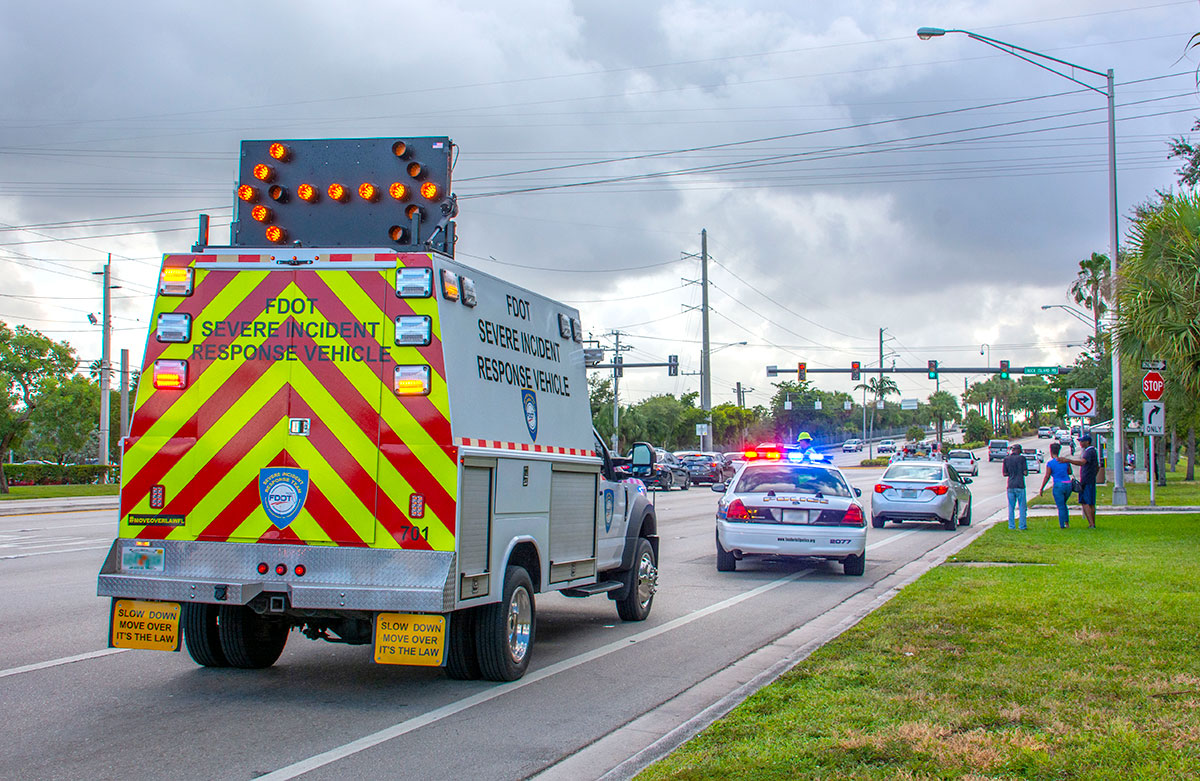February 4, 2021
Innovation of the Month:
NextGen TIM
Next-Generation Traffic Incident Management (NextGen TIM) focuses on working with State, local, and Tribal partners to improve traffic incident management on all roadways. These entities are poised to take TIM to the next level by using innovative TIM approaches that will continue to improve safety and travel reliability and save lives, time, and money. Over the next four weeks, we will go into more detail about each of the four NextGen TIM focus areas; local TIM programs, training, data, and technology, starting with local TIM.
While TIM efforts have traditionally focused on high-speed roadways, TIM concepts are applicable to all roads. Most roadway incidents actually occur on local roads and are responded to by local agencies. NextGen TIM seeks to apply TIM at the local-level by encouraging communication, coordination, and cooperation through the application of low-cost solutions like establishing a TIM committee or task force, providing training, and developing multi-discipline policies. Once foundational TIM program elements are in place, NextGen TIM data and technology advancements can also be considered and applied at the local level.
Florida Department of Transportation (FDOT) District Four's Arterial Management Program (AMP) is an example of local level NextGen TIM. The program's mission is to provide efficient active traffic management for incidents, special events, and planned construction on arterial roadways. The program strategies include signal retiming, traveler information dissemination, event management, and incident management. The need for the AMP was supported, in part, through the input received during bi-monthly TIM meetings, which FDOT has been facilitating in District 4 for over a decade.

To start, District Four, which includes five counties on the east coast of the State, took inventory of all available technologies, including advanced traffic management system combination controllers, signals that use signal preemption, and intelligent transportation system arterial device coverage. Next, they identified the arterial roadways within the county that had camera coverage and included them in the program. Lastly, the District implemented one severe incident response vehicle (SIRV) within a portion of the identified network.
The program's performance measures include tracking the number of monitored incidents, managed incidents, signal timing changes, average incident duration, benefit to cost ratio, and net benefit value. Over the course of a 6-month evaluation period, the total monthly benefits are estimated at approximately $312,000. These benefits include travel time/delay savings, reduction in emissions, reduction in fuel consumption, and safety benefits.
To learn more NextGen TIM, contact Paul Jodoin or James Austrich, EDC-6 team co-leads or visit the team’s EDC website.
Massachusetts Installs In-Vehicle Mobile Sensors for Enhanced Maintenance Decisions
The Massachusetts Department of Transportation (MassDOT) installed 10 mobile road weather surface sensors in its roadway supervisor units and a snowplow for the 2019-2020 winter maintenance season. The sensors report grip level, roadway and air temperature, surface condition, height of water, snow, and ice, relative humidity, and frost/dew points. On snowplows, the sensors are also able to assess the post-plow roadway conditions and pre-plow conditions when the plow blade is not down. The data is used for real-time treatment decisions, helping to prevent unnecessary roadway treatment leading to cost savings and reduced environmental impacts. The sensors allowed supervisors to make better decisions on providing safer roadways, especially at night, when temperature doesn't always give an accurate picture of the roadway conditions, particularly if they have been previously salted.
Due to the success of the sensors and a State Transportation Innovation Council incentive funds award, the Department installed an additional 15 sensors to its fleet in preparation for the 2020-2021 winter season, enabling all 20 area supervisor trucks to be equipped with the technology.
Each time MassDOT salts its 15,000 lane-mile roadway layout, it spends $85,000 or more on salt alone, potentially contaminating 1.44 billion gallons of groundwater beyond "drinkability." Considering it hits each of those lane miles between 150 and 350 times per winter season, if each depot can be frugal with salt yet still maintain safe roadways, they are not only generating savings by reducing salt usage but are also being better stewards of the environment.
To learn more about how Weather-Responsive Management Strategies can benefit your agency, contact David Johnson with the FHWA Office of Operations.
Video Series Promotes STEP Countermeasures

The FHWA Safe Transportation for Every Pedestrian (STEP) program has a series of videos that demonstrate how to reduce crash risk for pedestrians crossing roadways.
Each video highlights local transportation officials to show how pedestrians and drivers use or interact at the crossing improvements. The series explains the safety benefits of five countermeasures including:
- Crosswalk visibility enhancements
- Refuge islands
- Raised crosswalks
- Pedestrian hybrid beacons
- Road diets
You can use these videos in public meetings, conferences, or share them through social media to help educate pedestrians, drivers, and local decision-makers.
To learn more about the STEP countermeasures featured in these videos, please contact Becky Crowe of the FHWA Office of Safety or Peter Eun of the FHWA Resource Center.
About EDC
Every Day Counts, a State-based program of the Federal Highway Administration’s Center for Accelerating Innovation, works with State, local, and private sector partners to encourage the adoption of proven technologies and innovations to shorten and enhance project delivery.


